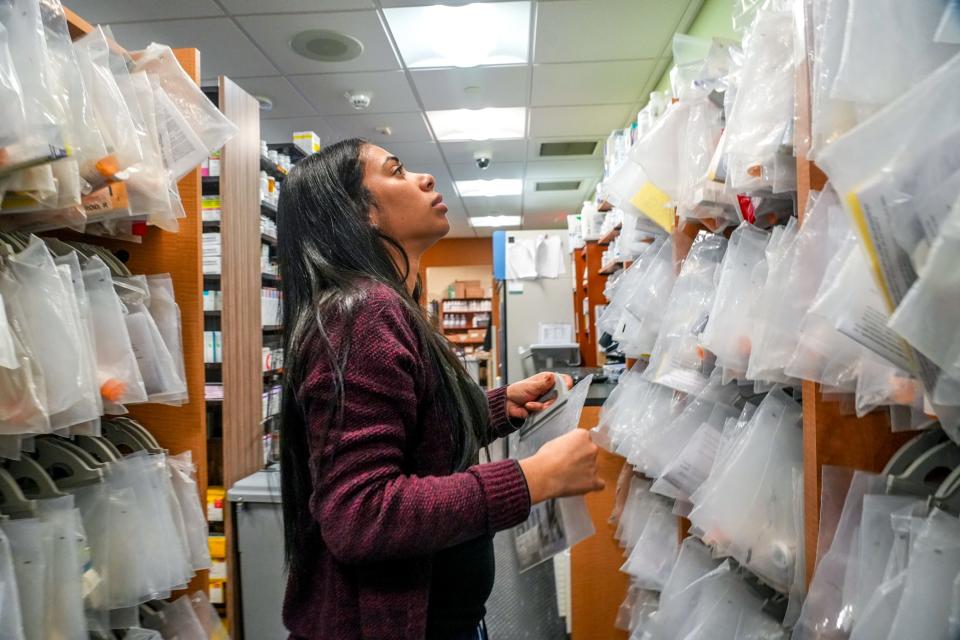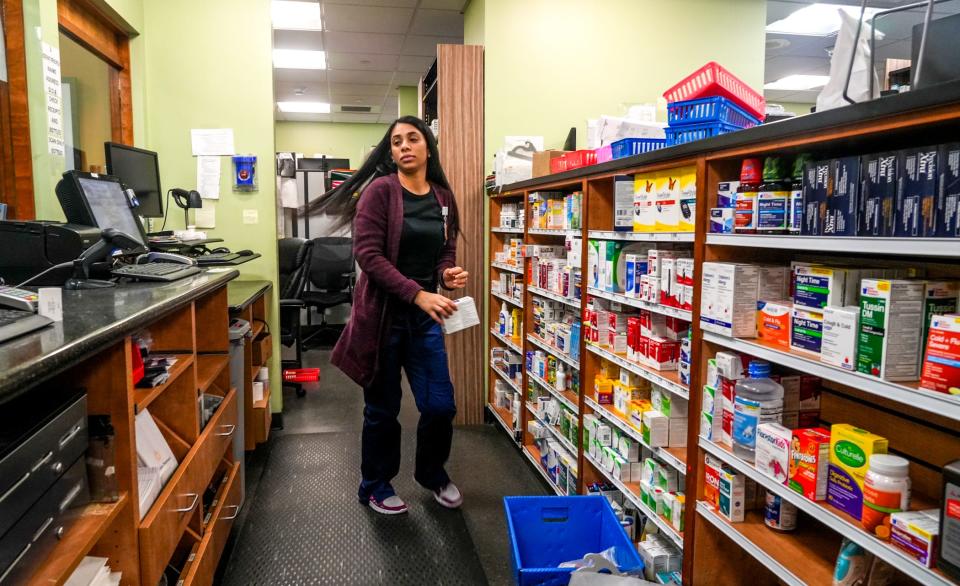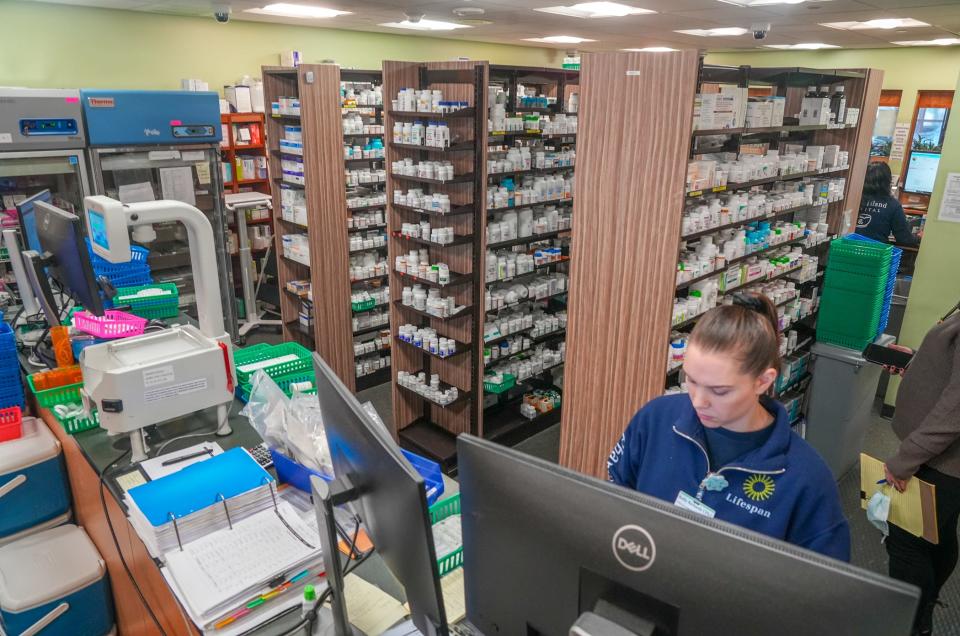The doctor shortage is crippling health care. Could pharmacists help?
- Oops!Something went wrong.Please try again later.
If you're like 80-plus million people across the nation, you're having a hard time seeing a primary care doctor. So, what do you do when the doctor won't see you now? Pharmacists may be able to help.
"The primary care shortage is a big issue," said Brian Musiak, the system director of pharmacy at Care New England. "As a pharmacy leader … we’re trying to see where we can fit, where we can help."
Already, pharmacists can give shots, evaluate and adjust medications, test for illnesses like COVID-19 and the flu and even point patients to specialists – all things that might otherwise send a patient to their regular doctor's office. As of last year, state law allows pharmacists to prescribe birth control and, for eligible patients, HIV-prevention medications. Some pharmacists also conduct annual wellness visits for people on Medicare.
"The insufficient number of primary care providers in the United States poses a serious public health threat," said Kerry LaPlante, dean of the University of Rhode Island's College of Pharmacy. "My in-laws have had access problems, my colleagues have access problems. When I speak to my colleagues in the inner city and ask what can our college do to help, they [respond] with 'get us primary care appointments.'"
Could a new pilot program be part of the solution?
Over the summer, URI and Lifespan embarked on a retreat. Their mission? Increase access to health care.
By the end, the two groups had hashed out plans for a not-yet-public partnership in the form of a pilot program, for now dubbed "RxSynergy."

The program will boost health care access for vulnerable populations and empower pharmacists to work at the top of their license. That means offering the full scope of services their training allows.
Pharmacy students would help staff the program, LaPlante said, meeting with patients at a clinic, interviewing them and taking stock of their medications.
"I have a vision that every patient in Rhode Island, when they’re on 10, 13 medications, they’re automatically consulted to see a pharmacist to manage their medications to support their primary care doc," LaPlante said.
LaPlante noted she even has patients on 27 medications, and thinks this should apply to them, too.
More: How can Rhode Island fix its primary care crisis? Here are some proposed solutions.
American Medical Association fighting 'scope creep' of pharmacists
Yet already, the American Medical Association has made itself a tough opponent of what it calls "scope creep," the expanding role of non-physician health care professionals amid a shortage in primary care. The association's concern reaches from nurse practitioners to physician assistants – and pharmacists.
Last year, the AMA published an article telling politicians, "don’t expand scope of practice for already overworked pharmacists." The association sounded the alarm on the Equitable Community Access to Pharmacist Services Act introduced in Congress, which would permit Medicare reimbursement for some shots, tests and treatments for illnesses like COVID-19 and respiratory syncytial virus, or RSV, which has emerged as a significant public health threat.
More: 'How did this happen?' Primary care shortage keeps hitting RI hard
"Because we’re not recognized as providers, we’re not able to bill for those same services," said Michael Poirier, system director of pharmacy ambulatory care services at Lifespan. "So being recognized as providers is one key opportunity in the state of Rhode Island, and even federally."
But in a letter to lawmakers, the AMA said the bill "would inappropriately allow pharmacists to perform services that would otherwise be covered if they had been furnished by a physician."
URI's LaPlante described the association as "skewed and biased," promoting physicians over quality patient care.
"We are certainly up there with clinical training hours to be able to manage patients," LaPlante said of pharmacists, whom she said undergo 6,000 hours of training.

But are pharmacists doing too much?
Not only do pharmacists administer vaccines, tests and more, but those embedded in hospital systems, who are different from those who work in chain drugstores, may also look for discounts on medications for patients or deal with insurers to obtain prior authorization – a major administrative headache for physicians.
Is the workload already too much?
"About 15 years ago, when we got the authority to administer vaccines, pharmacists were saying the same thing back then: We don’t want to add any more," said Chris Federico, president of the Rhode Island Pharmacists Association.
More: Walgreens pharmacists stage walkout just weeks after similar action by CVS staffers
Last fall, pharmacists at CVS and Walgreens walked off the job, protesting the workload and what they felt was inadequate staffing. While sources interviewed for this story don't see a pharmacist shortage in the state now, it may be on the way.
"We are very concerned about a future pharmacists shortage because of the publicity that has been out there with the burnout in retail pharmacy," said Christine Collins, senior vice president and chief pharmacy officer at Lifespan.

Yet one fact remains inescapable: Nearly 90% of Americans reside within five miles of a pharmacy, making them readily available options for health care, a point driven home by the pandemic.
"As pharmacists are still the most accessible care providers out there … some of the things we think are important is to continue to move the profession forward," Lifespan's Poirier said. "With pharmacists having advanced training oftentimes after their degree … we should be able to be reimbursed for some of these services we’re providing that are the same as physicians and others that are considered providers."
This article originally appeared on The Providence Journal: Pharmacists could help the doctor shortage, but some say it's asking too much

